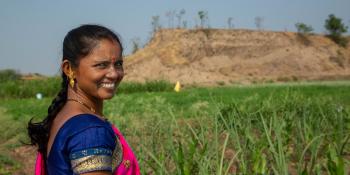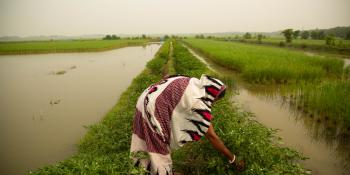330,000 farmers in Honduras and Colombia use tailored seasonal forecasts

Summary
Providing climate service information services to the most vulnerable communities remains a challenge. To overcome this challenge, the CGIAR Research Program on Climate Change, Agriculture and Food Security (CCAFS), together with International Center for Tropical Agriculture (CIAT), set up Local Technical Agroclimatic Committees (LTACs) in Colombia and Honduras. These committees work closely together with government, civil society, meteorological-services and farmers to produce specific agroclimatic recommendations in a participatory manner. They decide which climate-smart practices are to be implemented based on the climate information provided by CIAT and CCAFS.
Background
The production of most small-scale farmers in the developing world is vulnerable to climate variability. With adequate weather and climate information, farmers can adjust sowing dates and other agricultural practices, and become more resilient to climate variability. The provision of weather and climate information services is therefore an essential strategy to enhance food security. The challenge of broadening the impact of climate services to vulnerable communities remains.
CCAFS and its partners managed to overcome this challenge with an innovative approach that emerged from an exchange-experience between Senegal, Colombia and Honduras. A central aspect of this approach is the creation of LTACs, which CCAFS set up in Colombia and Honduras, working closely together with CIAT and the respective ministries of agriculture. In these committees, representatives from government, civil society, meteorological-services and farmers discuss climate forecasts and decide which climate-smart practices are to be implemented. With the aid of CIAT and CCAFS’s climate information, these committees can produce specific agro climatic recommendations on national or regional scale. With these recommendations small-holder farmers can decide better what varieties to plant, when to sow, how to control pests and diseases, and how to efficiently manage water and inputs.
In both countries up to 330,000 farmers are now being reached through 9 LTACs. The government of Colombia stated in its Nationally Determined Contributions that it plans to expand its network of LTACs to 15 by 2030. In the medium-term, the project is expected to reach almost 1.6 million farmers. CIAT and CCAFS’ agroclimatic prediction science has therefore profoundly changed how agricultural sector organizations generate and share climate variability adaptation recommendations.
Key facts
- Access to weather and climate information services are a key component of increasing climate resilience.
- The exchange-experience between Senegal, Colombia and Honduras resulted in the establishment LTACs.
- Colombia included the establishment of 15 LTACs in its nationally determined contributions.
- Up to 330,000 farmers are now being reached through 9 LTACs in Colombia and Honduras.
- In the medium-term, the project is expected to reach almost 1.6 million farmers.
Lessons: Key elements of success
- The South-South knowledge exchange program led to the implementation of effective weather and climate information services in Colombia and Honduras.
- The establishment of the LTACs enables scientists, local-actors and farmers to discuss recommendations based on CIAT and CCAFS’ climate information.
Further reading
- 2016 Annual Report story: Weather and climate information, South-South cooperation help farmers in Colombia and Honduras manage climate change
- Outcome case study: Scaling up climate advisories in Senegal and Colombia
- Project page: Tailored agro-climate services and food security information for better decision making in Latin America
- Blog: Agroclimatic information: a commitment to innovate and increase food security
- Blog: Bridging the gap between climate science and farmers in Colombia

